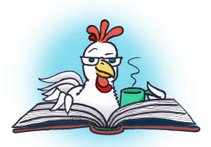Tonight marks the start of Yom Kippur, the Jewish Day of Atonement. This is the first year in almost a decade that I haven't had the Jewish holidays off work, and I'm thinking wistfully of the holiday book collection at my old job and wishing I could get my hands on some of them now, to share with my daughter and to think about myself.
The central concept of Yom Kippur is tshuvah. Though tshuvah is generally translated as "repentance," it literally means "turning": turning from sin--however you define that, whether it be hurtful behavior or not living up to one's own potential--to something better. Trying, and failing, and apologizing to whoever you hurt, and trying to make restitution if you can, and then getting back on that horse and trying again.
This is a concept that even--or maybe, especially--young kids can understand, and there are several decent children's books on the topic. One perennial favorite is Gershon's Monster, by that doyen of Jewish holiday books (and Anansi stories, while he's at it) Eric Kimmel. Instead of repenting or apologizing for any of his little thoughtless acts, Gershon sweeps them up and puts them in the cellar. On Rosh Hashanah, the Jewish New Year, he tosses them all into the sea. Eventually all the un-dealt-with sins become a huge monster that threaten what is dearest and most precious to him. There are echoes of King Lear and other old, dark tales in this simple story, but it never seemed to bother the enraptured kids who sought the book out by name even in the off-season. I think they recognized the power and truth behind it. Or maybe they just liked the big scary monster, as illustrated by Caldecott Honor medalist Jon Muth.
Jacqueline Jules's The Hardest Word is more nakedly didactic, but still enjoyable. The Ziz (an imaginary huge bird creature that apparently has its origins in Jewish mythology), after destroying a vegetable garden, must do repentance by finding and saying the very hardest word of all. Any guesses what it is? (hint: it starts with an "S.") Kids enjoy this one, too, and can identify with the well-meaning but hapless Ziz.
For my money, though, the best book about tshuvah is a title doesn't even refer to Yom Kippur, or to Judaism at all. In Lilly's Purple Plastic Purse, by Kevin Henkes, Lilly goes through all the important steps of true repentance after drawing a mean picture of her teacher, Mr. Slinger, in a burst of temper: She owns up to what she did, she feels true remorse, she makes restitution by drawing a nicer picture and writing a story and bringing in home-baked cheese balls, and she apologizes in person. She even does the hardest thing of all, which is to confront the evidence of her wrongdoing when Mr. Slinger gently brings out the dreaded picture and asks what she thinks he should do with it.
I'll be thinking of Lilly tomorrow night when the final shofar blast sounds and everyone cheers, and then the whole congregation--like Mr. Slinger's class--eats some tasty snacks. Tshuvah like hers deserves a celebration.
Subscribe to:
Post Comments (Atom)

3 comments:
You are so right: Lily is a fabulous character to ponder together today.
You've just made me see that book in a whole different light.
Ohh... no-frills cheese balls! (Not for Yom Kippur, though). For the record, I think that the Pirate Booty people's "Cannon Balls" are the closest things I've ever come to Lilly's no-frills cheese balls.
Nat Schlesinger Killed his brother Jack and he also stole his entire estate
Post a Comment